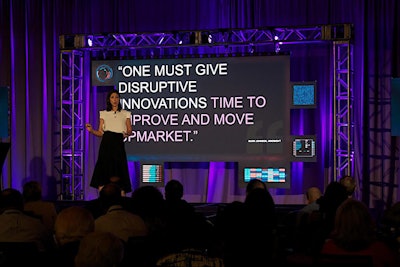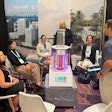
At the opening session of DigitalNow Thursday at the Walt Disney World Swan and Dolphin Resort, author and researcher Rachel Botsman told the audience of association executives that the rapid rise of disruptive start-ups such as Uber and Airbnb provides valuable lessons for traditional businesses and associations. These companies are part of what is called the “sharing economy” or the “collaborative economy,” and Botsman said they are expected to generate $235 billion in revenue in the next two years.
“It’s very real and it’s disrupting many sectors very fast,” she said. “And there are similarities between these companies and the role you play in the world. First, they depend on trust, but it’s a new kind of peer-driven trust. The second thing is that many of these companies are platforms that have to act as mutual matchmakers. And lastly their role is to bring people together. So they share a lot of characteristics with associations.”
The reason these start-ups are succeeding is that they are taking existing assets and “putting them into decentralized networks and marketplaces in ways that match a ‘need’ with a ‘have’ that bypasses a traditional organization,” Botsman said. To embrace this new model for business, she suggested leaders evaluate the assets they have, whether physical assets or human assets such as skills and passions, to create new value for customers.
After researching more than 350 start-ups from 32 countries, Botsman has identified five common drivers that make a sector ripe for disruption.
1. Complex experiences
Uber is an example of a company that is succeeding because it eliminates some of the complexity, frustration, and time involved with traditional taxi service. “The public has discovered a new way to get around, and once that genie is out of the bottle, that a new way exists and that new way is better, you can’t reverse the story,” Botsman said.
2. Waste
Airbnb is an example of a start-up that is facilitating access to wasted inventory, in this case rooms and properties that might otherwise be empty. “More than one million people every single night are now staying on Airbnb. What makes Airbnb so powerful is they are not just building a marketplace. It’s not about transactions. It’s a community of people having a different type of travel experience. That is very hard for a competitor to replicate,” Botsman said.
3. Broken trust
Collaborative start-ups are succeeding because they create transparent systems that allow a new type of peer-to-peer trust to emerge. Botsman said TransferWise, a system that bypasses banks and directly matches people that need to exchange currency, is an example of “the great trust shift that is under way … from institutions to individuals.”
4. Redundant intermediaries
Collaborative start-ups are allowing a direct exchange between suppliers and customers, which changes the supply and demand of labor. Botsman said TaskRabbit, which allows people to bid to do work for others, is an example of this. “Social networks are just the beginning. What’s happening is something called service networking. What we are starting to figure out is how we use these networks to get things done in the real world,” she said.
5. Limited access
“What’s happening is this massive generational shift where all of a sudden we value access over ownership,” Botsman said. Examples include car-sharing services and even pet-sharing, such as Borrow My Doggy. Botsman said the challenge for brands will be to develop new ways to be in their customers' lives. One example Botsman gave is BMW, which created its DriveNow car-sharing system that is available in San Francisco and several cities in Europe.



















